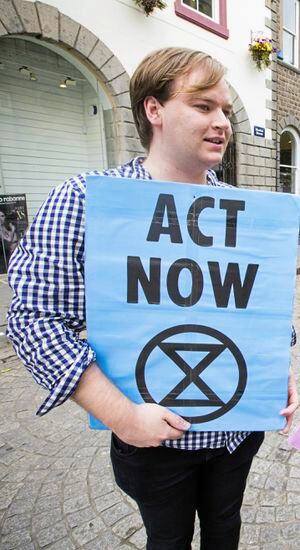‘Frequent flights by wealthy is the big climate change issue’
ENVIRONMENTAL campaigners have said that frequent flying by the very wealthy is the urgent climate change problem.

A member of the Guernsey branch of Extinction Rebellion has taken a pragmatic view after social media criticism that three Environment & Infrastructure members and two civil servants had flown to a climate change summit in Jersey.
The XR branch is keen to highlight that it is the most affluent who have the biggest carbon footprint, which leads to global warming, habitat devastation and species loss.
According to its figures, 70% of all flights in the UK are taken by 15% of people, and private jets, which make up 6% of UK-EU flights, emit around 10 times more than someone in economy on a commercial airline.
Deputies Barry Brehaut, Lindsay de Sausmarez and Mark Dorey faced the backlash for flying to the tri-island summit, where they offset their emissions by, among other things, planting more than 100 trees.
E&I is drawing up a climate change policy and action plan, which could have major ramifications for the way islanders drive, heat their homes and buy food.
Jersey and the Isle of Man are considered to be further ahead with their work on climate change. For instance, Jersey is looking at establishing a citizens’ assembly to bring the community on board.
William Carter of Extinction Rebellion said the summit was good news and he took a pragmatic view on the flights.
‘The fact that this summit is taking place is very encouraging,’ he said.
‘It would be great if E&I members did travel by sea rather than air, but if this isn’t possible, which it may not be, they could compensate by offsetting their emissions, such as via the website Atmosfair.’
Condor Liberation was out of action on the day of the summit, but the Clipper and Rapide were operating. The freight company Iris does run a foot passenger service, but that would have required an overnight stay.
As a whole the States does not have any policies in place to offset flight emissions for its workers and Mr Carter would like that to be looked at.
‘The States and all large organisations should incorporate offsetting into their governance procedures if they do fly.
‘More importantly still, the debate on flying needs to move away from looking at individual flying decisions to a more systemic approach which recognises that it is frequent flying, typically by the most affluent, that needs to be tackled most urgently.
‘Tackling this idea of inequality of consumption in aviation is crucial for climate justice.’
A key message from Extinction Rebellion is fly less.
The group supports the campaign called A Free Ride, which wants to see a frequent flyer levy, while making everyone’s first flight of the year tax-free so that ordinary holidaymakers and travellers would not be hit.
The campaign also calls for electric-only private jets from 2025.
Mr Carter would like to see a version of that implemented locally, with the caveat of incorporating the sensitivities of an island situation.





